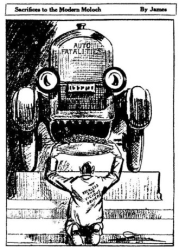In the Old Testament, the Israelites were constantly straying into idolatry, and one false god that snared them is specifically connected to the hideous practice of infant sacrifice. The Ammonite idol Moloch was worshipped first by the Canaanites, who then transmitted their practices to the Israelites. The worship of Moloch, which included ritualized carnal acts as well as infant sacrifice, was associated with intercession for the idol’s favor – a plea for prosperity.
Jewish tradition describes the practice of infant sacrifice:
Tophet is Moloch, which was made of brass, having the face of an ox; and they heated him from his lower parts; and his hands being stretched out, and made hot, they put the child between his hands, and it was burnt; when it vehemently cried out; but the priests beat a drum, that the father might not hear the voice of his son, and his heart might not be moved.
This practice is depicted as possibly the worst offense committed by the Israelites, as it is often listed first, and frequently singled out – though it could be included in the general condemnation of idolatry. God, speaking through Ezekiel, said,
Moreover you took your sons and your daughters, whom you bore to Me, and these you sacrificed to them to be devoured. Were your acts of harlotry a small matter, that you have slain My children and offered them up to them by causing them to pass through the fire?
This offense is so great that, even after its chief perpetrator, Manasseh, repented in his old age and his grandson, Josiah, led a great revival, God still pronounced destruction on the Israelites of Judah:
Now before [Josiah] there was no king like him, who turned to the Lord with all his heart, with all his soul, and with all his might, according to all the Law of Moses; nor after him did any arise like him. Nevertheless the Lord did not turn from the fierceness of His great wrath, with which His anger was aroused against Judah, because of all the provocations with which Manasseh had provoked Him.
 Throughout history, Moloch has been portrayed as a proxy for the sacrifice of innocents in order to gain material well-being. In 1923, backlash against a frightening increase in the number of pedestrian children being killed by motor vehicles led to a St. Louis Star political cartoon entitled, The Modern Moloch, in which a man offers a platter of children’s corpses to the leering grill of a monstrous car. In Fritz Lang’s 1927 blockbuster silent film Metropolis, workers are thrown to their deaths to oil the cogs of Mol0ch, a giant machine that powers the wealthy upper city. In his volume, The Gathering Storm (1948), Winston Churchill described the near worship of Adolf Hitler and his prewar economic reforms in Molechian terms.
Throughout history, Moloch has been portrayed as a proxy for the sacrifice of innocents in order to gain material well-being. In 1923, backlash against a frightening increase in the number of pedestrian children being killed by motor vehicles led to a St. Louis Star political cartoon entitled, The Modern Moloch, in which a man offers a platter of children’s corpses to the leering grill of a monstrous car. In Fritz Lang’s 1927 blockbuster silent film Metropolis, workers are thrown to their deaths to oil the cogs of Mol0ch, a giant machine that powers the wealthy upper city. In his volume, The Gathering Storm (1948), Winston Churchill described the near worship of Adolf Hitler and his prewar economic reforms in Molechian terms.
The similarities between this idolatrous infant sacrifice and today’s mass murder of the unborn are revealing. Most abortions are at the alter of modern prosperity – a sacrifice in order to increase the chance of gaining or keeping prosperity. Attempts to keep mothers from seeing imagery of the unborn children conjure up the drowning out of infant cries with beating of drums in an attempt to keep the mother’s “heart from being moved.” The methods of killing are far more cruel than even Rabbi Itzhaki’s chilling description.
Despite American evangelicalism’s fixation on sexual impurity, it does seem “a small matter” compared with the fifty-six MILLION unborn legally killed in America since Roe v. Wade in 1973. By 2020, the number of children killed in the U.S. will be higher than TWICE the current population of Canada. I fear that, even if we experience a revival equal to that of Josiah, the “great wrath” of God will not be stayed, because of “all the provocations with which Manasseh had provoked Him.”
God help us.
